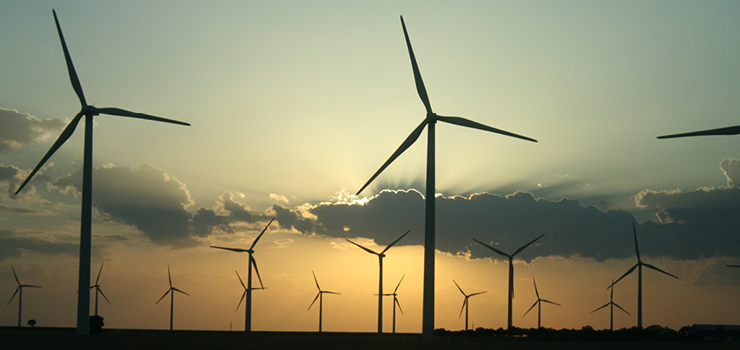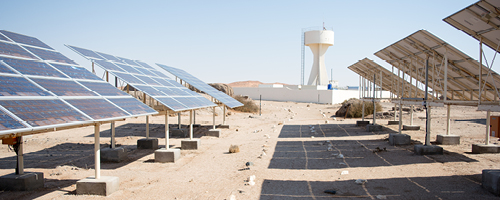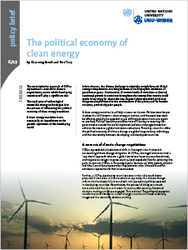Policy Brief
The political economy of clean energy
In broad terms, the climate challenge is relatively straightforward. Global average temperatures are rising because of anthropogenic emissions of greenhouse gases. Continuation of current levels of emissions or (worse) continued growth in emissions throughout the twenty-first century could result in warming far above the two-degree Celsius threshold with very dangerous implications for the environment of the planet and for human societies, particularly poor people.
The more inclusive approach of COP21 represented a new era in climate negotiations, one in which developing countries will play a significant role
The rapid pace of technological renewable energy technologies is in the process of influencing the political economy of clean energy transitions
A clean energy transition is not necessarily an impediment to the growth aspirations of the developing world
A clean energy transition is unlikely to occur on its own. Policies must be put in place that will foment a clean energy transition, and these policies must be effective globally (as opposed to just shifting emissions from one region to another). Political economy considerations will be key to ensuring that governments around the world implement policies and programmes that achieve the necessary global emissions reductions. Three key areas that effect the political economy of climate change are global negotiations, technology, and the relationship between developing and developed countries.
A new era of climate change negotiations
COP21 represented a fundamental shift in the negotiation framework surrounding climate change mitigation. At COP15, the negotiations retained a ‘top-down’ approach wherein a global emissions trajectory was determined, and negotiators sought to parse country-level responsibilities for achieving this path. In contrast, COP21 in Paris employed a ‘bottom-up’ offer system, wherein individual countries propose what they perceive to be achievable and fair emissions trajectories for their circumstances.

Further, at COP21 developing countries came to the table much better prepared. It would be an overstatement to say today that climate change information has been fully internalized and appropriate policies assessed in developing countries. Nevertheless, the process of doing so is much more advanced than it was in 2009. In country after country, the central decision-making units have engaged. This is critical. The profound economic transformations inherent in a clean energy transition will need to be fully integrated into economic decision-making.
Technology drivers
Historically, governments aiming to take deliberate action to correct the colossal market failure of greenhouse gas (GHG) emissions have suffered from a ‘chicken and egg’ problem. Specifically, many technologies that offered long-run potential to support a clean energy transition were also small-scale, immature, and relatively high-cost. As a result, they were largely unattractive to private investors. While these factors provide a solid economic rationale for government support, the politics of supporting small-scale, immature, and relatively high-cost technologies are nonetheless difficult. Difficult politics inevitably constrains the ambition of policies that are crucial for technology development.
Often, regulation and governance lag behind technology innovation, compelling forms of institutional innovation to play catch up. Ongoing innovations in energy systems often require either adaptations of established regulatory constructs to accommodate innovative technologies or broad-based reform of the regulatory constructs themselves.
 Technology is highly likely to remain one of the key driving factors influencing climate commitments and energy-related development goals, both in terms of goal-setting and implementation. What is technically possible and economically attractive today, is much greater than it was during the Kyoto Protocol era. To seize the opportunities offered by this technical advance, equally innovative approaches to regulation and policy are likely to be required.
Technology is highly likely to remain one of the key driving factors influencing climate commitments and energy-related development goals, both in terms of goal-setting and implementation. What is technically possible and economically attractive today, is much greater than it was during the Kyoto Protocol era. To seize the opportunities offered by this technical advance, equally innovative approaches to regulation and policy are likely to be required.
Developing and developed economies
The challenges facing developed and developing economies do differ in important ways. Developing countries’ economies can be expected to grow more rapidly than developed economies. Accordingly, the demand for new energy supply is likely to be much greater in the developing than in the developed world.
However, developing countries may possess inherent advantages in terms of clean energy endowments. Many developing countries are relatively well endowed with sun, wind, and unexploited hydropower potential. In a world dominated by clean energy systems, many developing countries possess an inherent comparative advantage in energy-intensive activities. For these reasons, a clean energy transition is not necessarily an impediment to the growth aspirations of the developing world. And there are a series of solid rationales for developed countries to assist developing countries in realizing a clean energy transition. Not least, a failure on the part of developing countries to transition to cleaner energy sources implies a failure to stabilize the global climate, with negative implications for everyone
Looking forward
A clean energy transition is highly unlikely to occur on its own. Policies must be put in place that will foment a clean energy transition, and these policies must be effective globally
The profound economic transformations inherent in a clean energy transition will need to be fully integrated into economic decision-making
Developed countries should assist developing countries in realizing a clean energy transition
A clean energy transition is not easy. Even if the technical path is clear and fully illuminated, a clean energy transition will involve the shift of resources between competing economic sectors and political constituencies alongside changes in institutional and policy frameworks. Stakeholders in this process have varying degrees of political and economic power. Regardless of the society or the political system, understanding how political economy factors influence clean energy transitions is crucial to effective policy formulation and facilitating transitions to sustainable energy systems.
 Join the network
Join the network